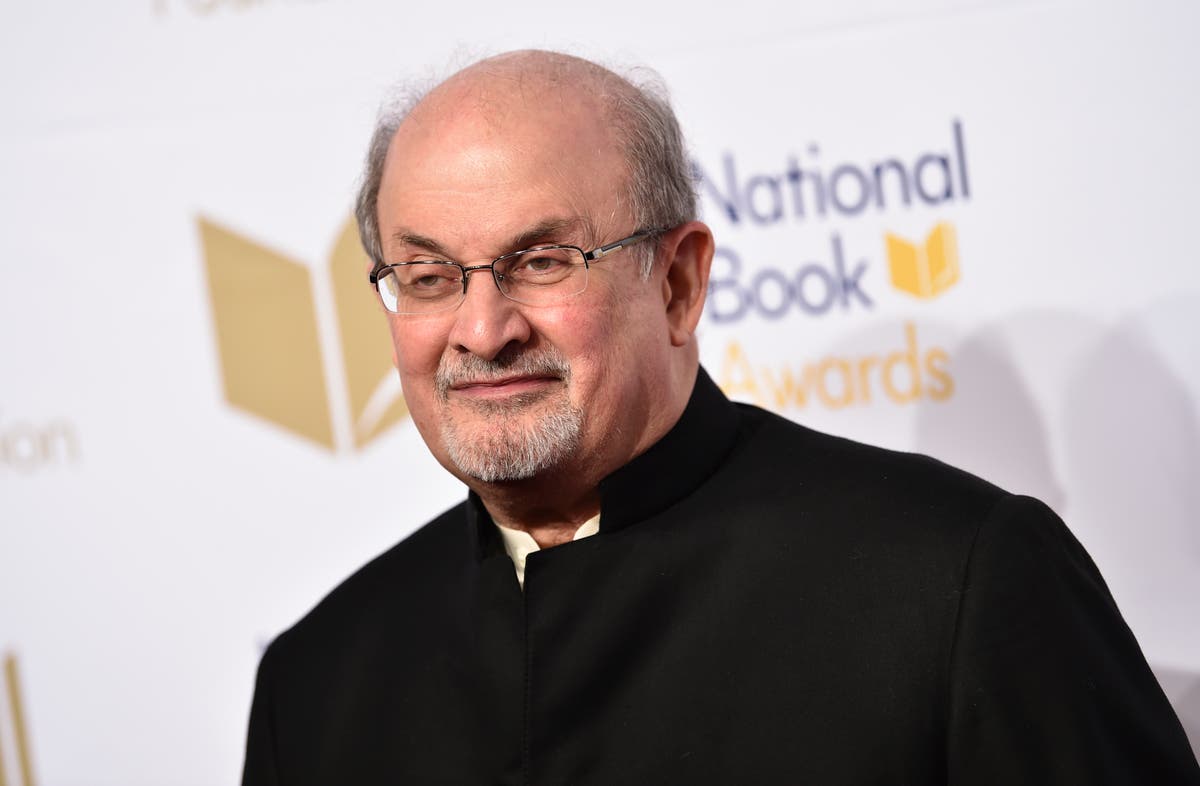
Sign up for the View from Westminster email for expert analysis straight to your inbox Get our free View from Westminster email Please enter a valid email address Please enter a valid email address SIGN UP I would like to be emailed about offers, events and updates from The Independent. Read our privacy notice Thanks for signing up to the
View from Westminster email {{ #verifyErrors }}{{ message }}{{ /verifyErrors }}{{ ^verifyErrors }}Something went wrong. Please try again later{{ /verifyErrors }}
Salman Rushdie was stabbed on stage at the Chautauqua Institution in New York state on Friday just as he was about to give a lecture. The attack comes 33 years after Iran’s Ayatollah Khomeini issued the first formal fatwa against Rushdie over the 1988 book The Satanic Verses – a satirical take on religion, culture and identity in the Indian subcontinent that followed up on Rushdie’s magical realist allegory of the region in Midnight’s Children and Shame – putting a bounty of $3m (£2.5m) on the author’s head for blaspheming against Islam’s prophet Muhammad.
Over the past three decades, many translators and publishers affiliated with The Satanic Verses have been killed or injured, including those in Japan, Italy, Norway and Turkey. In all these years, Rushdie has continued to feature prominently on the hit lists of jihadist groups, from Hezbollah to al-Qaeda.
Fatwas calling for his head have been omnipresent in the Muslim world, even in the officially secular Bangladesh and the “moderate” Malaysia sinceThe Satanic Verses was published. A 1990 Pakistani film, International Gorillay, was based on the lead actors plotting the killing of Rushdie, who is eventually struck down by flying Qurans, as the female protagonist exclaims: “Today your death will be a warning to the rejectors of the prophet.” Pakistan’s recently ousted prime minister, Imran Khan, continues to cite Rushdie in his recent bid to export Islamic blasphemy laws to the West, expressing a similar desire to instil global fear over sacrilege against Islam.
This quest of Khan, and his Islamist friends, such as Recep Erdogan and Mahathir Mohamad, to prevent Islam from being treated as other religions are, is already in vogue in the West. The European Court of Human Rights has ruled that mocking Muhammad is a hate crime, even as cartoonists and satirists exercising their freedom of expression against Islam have been attacked in Denmark, Sweden and other parts of the continent. Journalists affiliated with satirical publication Charlie Hebdo were massacred for caricaturing Muhammad in 2015. Samuel Paty, a French teacher who showed the Charlie Hebdo cartoons to his class, was beheaded in 2020.
While the UK has stood by Rushdie all these years, even as his knighthood in 2007 invited a backlash from many Muslim countries, Britain has seemingly given up on the free speech ideals that the author has stood for. In June, screenings of the film The Lady Of Heaven were cancelled in the UK after protests about alleged blasphemy. Last year, a Batley Grammar School teacher lost his job and had to go into hiding after receiving threats for showing Charlie Hebdo caricatures in a class on blasphemy. And the British press customarily joins the vast majority of its Western colleagues in refusing to print any pictorial depiction of Islam’s prophet even when reporting on the killings related to those very images.
This at a time of the prevalence of gory blasphemy laws in the Muslim world, with 12 Muslim-majority countries punishing the victimless crime with death and 20 others with harsh prison sentences. In addition to antediluvian codes in these countries, mobs continue to target individuals by torching them in schools, hanging bodies from trees or beheading them in shops because of blasphemy against Islam. Just as the Muslim-majority countries enacting Islamic sharia obviously do not uphold identical punishments relating to blasphemy against other religions, many well-meaning progressives in the West forgo the founding principle of free speech to shield Islam alone from critique.
The idea that Islam deserves special protection against offensive expression is relentlessly encouraging blasphemy violence. And it is this continued global privileging of Islam that has led to the murder attempt against Salman Rushdie.
To keep up to speed with all the latest opinions and comment, sign up to our free weekly Voices Dispatches newsletter by clicking here
For far too long the Islamist thuggery over blasphemy has been allowed to prevail over reason and rationality by us in Muslim countries and communities. While Islamists benefit from silencing any challenge to their ideological puritanism, it is the failure of moderate Muslims to stand by freedom of religion, conscience and speech opposing Islam that is upholding this Islamist inertia on blasphemy. Many of the progressive voices are either silenced by murderous blasphemy codes and the veritable threat of mob violence, or prefer to partake in the perilous conflation of Islam and Muslims, ostensibly to defend the Muslim minorities against bigotry.
We need to muster the common sense that freedom of speech is designed to protect precisely what is deemed “unacceptable”, including unabashed disrespect of the holiest of ideas, regardless of the demographic that adheres to them. It shouldn’t need any form of courage to exclaim that absolutely no one deserves to be killed for disparaging any text or personality, including those affiliated with Islam, regardless of any scriptural claims. After the ghastly attack on the most prominent Muslim-heritage dissenter of recent times, it is time we finally stood by the dissidents and not their attackers.








